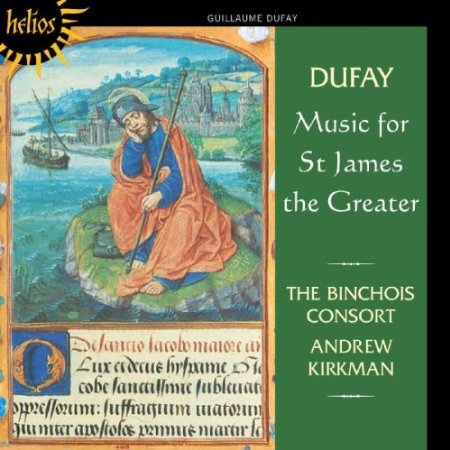Dufay Mass for St James etc
View record and artist detailsRecord and Artist Details
Composer or Director: Guillaume Dufay
Genre:
Vocal
Label: Hyperion
Magazine Review Date: 7/1998
Media Format: CD or Download
Media Runtime: 67
Mastering:
Stereo
DDD
Catalogue Number: CDA66997

Tracks:
| Composition | Artist Credit |
|---|---|
| Missa S Jacobi |
Guillaume Dufay, Composer
Andrew Kirkman, Conductor Binchois Consort Guillaume Dufay, Composer |
| Rite majorem Jacobum canamus/Arcibus summis miseri |
Guillaume Dufay, Composer
Andrew Kirkman, Conductor Binchois Consort Guillaume Dufay, Composer |
| Balsamus et munda cera/Isti sunt agni novelli |
Guillaume Dufay, Composer
Andrew Kirkman, Conductor Binchois Consort Guillaume Dufay, Composer |
| Gloria "Resurrexit dominus" and Credo "Dic Maria" |
Guillaume Dufay, Composer
Andrew Kirkman, Conductor Binchois Consort Guillaume Dufay, Composer |
| Apostolo glorioso |
Guillaume Dufay, Composer
Andrew Kirkman, Conductor Binchois Consort Guillaume Dufay, Composer |
Author: David Fallows
This is Dufay as I have always wanted to hear him. In what is only their second CD (the first was on Hyperion, 9/96), The Binchois Consort show absolute mastery of Dufay’s difficult early style, with immaculate balance, wonderfully free phrasing, and crystalline clarity. Moreover in the Missa S Jacobi Andrew Kirkman shows an uncanny ability to set the perfect tempo every time, so that the music emerges with its full force.
The Missa S Jacobi is an odd but supremely important work. It is one of two early Dufay Mass cycles that have rarely been recorded, partly because they are less obviously part of the grand tradition than his later four-voice cantus firmus Masses. And this one is particularly difficult because its many different textures and styles present a severe challenge if it is not to seem fragmented and incoherent. Here it stands as a glorious masterpiece, its nine movements spanning over 40 minutes, with the various styles acting as necessary contrast and culminating in the famous Communion that Heinrich Besseler many years ago argued was the earliest example of Fauxbourdon writing.
Strangely, two of the motets work less well: both the earlier Rite majorem and the later Balsamus seem to go too fast for the details to have their full effect, perhaps because they are so strikingly different in style from the other works performed here. And it seems a touch perverse to use the now fashionable ‘old French’ pronunciation of Latin, particularly in a motet composed for a papal ceremony (even if the original singers would have been Franco-Flemish): in all his early motets the text seems centrally important, and this kind of pronunciation loses too many of the consonants.
But the Italian-texted Apostolo glorioso is again quite superb, as is the astonishing Gloria and Credo pair. Briefly, then, this is as close to a perfect Dufay CD as I have heard.'
The Missa S Jacobi is an odd but supremely important work. It is one of two early Dufay Mass cycles that have rarely been recorded, partly because they are less obviously part of the grand tradition than his later four-voice cantus firmus Masses. And this one is particularly difficult because its many different textures and styles present a severe challenge if it is not to seem fragmented and incoherent. Here it stands as a glorious masterpiece, its nine movements spanning over 40 minutes, with the various styles acting as necessary contrast and culminating in the famous Communion that Heinrich Besseler many years ago argued was the earliest example of Fauxbourdon writing.
Strangely, two of the motets work less well: both the earlier Rite majorem and the later Balsamus seem to go too fast for the details to have their full effect, perhaps because they are so strikingly different in style from the other works performed here. And it seems a touch perverse to use the now fashionable ‘old French’ pronunciation of Latin, particularly in a motet composed for a papal ceremony (even if the original singers would have been Franco-Flemish): in all his early motets the text seems centrally important, and this kind of pronunciation loses too many of the consonants.
But the Italian-texted Apostolo glorioso is again quite superb, as is the astonishing Gloria and Credo pair. Briefly, then, this is as close to a perfect Dufay CD as I have heard.'
Discover the world's largest classical music catalogue with Presto Music.

Gramophone Digital Club
- Digital Edition
- Digital Archive
- Reviews Database
- Full website access
From £8.75 / month
Subscribe
Gramophone Full Club
- Print Edition
- Digital Edition
- Digital Archive
- Reviews Database
- Full website access
From £11.00 / month
Subscribe
If you are a library, university or other organisation that would be interested in an institutional subscription to Gramophone please click here for further information.




